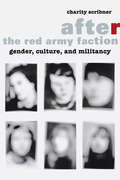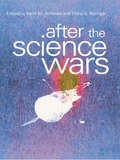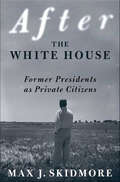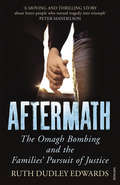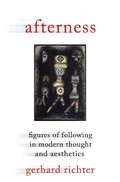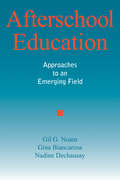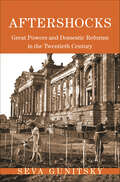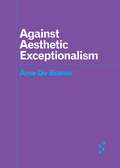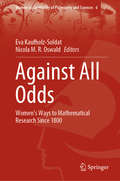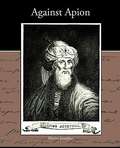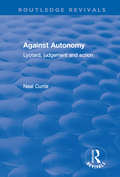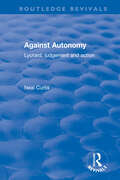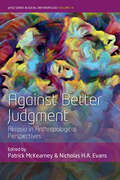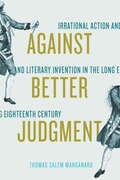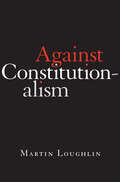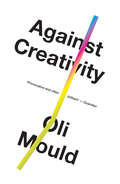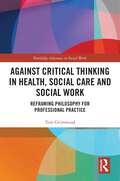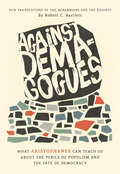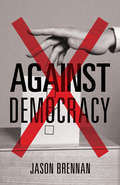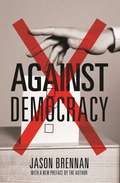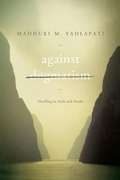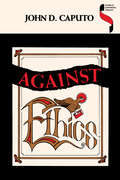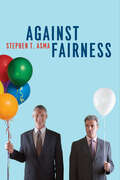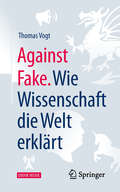- Table View
- List View
After the Red Army Faction: Gender, Culture, and Militancy
by Charity ScribnerMasterminded by women, the Red Army Faction (RAF) terrorized West Germany from the 1970s to the 1990s. Afterimages of its leaders persist in the works of pivotal artists and writers, including Gerhard Richter, Elfriede Jelinek, and Slavoj i ek. Why were women so prominent in the RAF? What does the continuing cultural response to the German armed struggle tell us about the representation of violence, power, and gender today? Engaging critical theory, Charity Scribner addresses these questions and analyzes signal works that point beyond militancy and terrorism. This literature and art discloses the failures of the Far Left and registers the radical potential that RAF women actually forfeited.After the Red Army Faction maps out a cultural history of militancy and introduces "postmilitancy" as a new critical term. <P><P>As Scribner demonstrates, the most compelling examples of postmilitant culture don't just repudiate militancy: these works investigate its horizons of possibility, particularly on the front of sexual politics. Objects of analysis include as-yet untranslated essays by Theodor Adorno and Jürgen Habermas, as well as novels by Friedrich Dürrenmatt and Judith Kuckart, Johann Kresnik's Tanztheaterstück Ulrike Meinhof, and the blockbuster exhibition Regarding Terror at the Berlin Kunst-Werke. Scribner focuses on German cinema, offering incisive interpretations of films by Margarethe von Trotta, Volker Schlöndorff, and Fatih Akin, as well as the international box-office success The Baader-Meinhof Complex. These readings disclose dynamic junctures among several fields of inquiry: national and sexual identity, the disciplining of the militant body, and the relationship between mass media and the arts.
After the Science Wars: Science and the Study of Science
by Keith Ashman Phillip BarringerThe "War" in science is largely the discussion between those who believe that science is above criticism and those who do not. After the Science Wars is a collection of essays by leading philosophers and scientists, all attempting to bridge interdisciplinary gulfs in this discussion.
After the White House: Former Presidents as Private Citizens
by Max J. SkidmoreWhat exactly has Bill Clinton been doing since he left office? What can he expect to accomplish? What have his predecessors in his position done? Many presidents have had enormous impacts on the course of history after their terms ended, but not until After the White House by Max J. Skidmore has their role been examined. Thirty-two completed their terms. Four became presidential candidates again (one was even elected), two served in Congress, one abandoned his country to accept election to the Confederate Congress, one became Chief Justice, and one has the unique distinction of having his First Lady become a United States senator. Former presidents almost always remain influential, but their post-term activities have received little attention or scrutiny until now.
Aftermath: The Omagh Bombing and the Families' Pursuit of Justice
by Ruth Dudley EdwardsOn Saturday 15th August, 1998, a massive bomb placed by the so-called Real IRA ripped through the town of Omagh, killing twenty-nine people, including eleven children, and injuring over two hundred. It was the worst massacre in Northern Ireland's modern history- yet from it came a most extraordinary tale of human resilience, as the families of ten of the dead channelled their grief into action.Taking for their motto, 'For evil to triumph, all that is necessary is for good men to do nothing', they decided to pursue the men whom the police believed responsible for the atrocity through the civil courts, where the burden of proof is lower. This is the remarkable account of how these families- who had no knowledge of the law and no money- became internationally recognised, formiddable campaigners and surmounted countless daunting obstacles to win a famous victory.Longlisted for the Orwell Prize 2010
Afterness: Figures of Following in Modern Thought and Aesthetics (Columbia Themes in Philosophy, Social Criticism, and the Arts)
by Gerhard RichterGerhard Richter's groundbreaking study argues that the concept of "afterness" is a key figure in the thought and aesthetics of modernity. It pursues questions such as: What does it mean for something to "follow" something else? Does that which follows mark a clear break with what came before it, or does it in fact tacitly perpetuate its predecessor as a consequence of its inevitable indebtedness to the terms and conditions of that from which it claims to have departed? Indeed, is not the very act of breaking with, and then following upon, a way of retroactively constructing and fortifying that from which the break that set the movement of following into motion had occurred? <P><P>The book explores the concept and movement of afterness as a privileged yet uncanny category through close readings of writers such as Kant, Kafka, Heidegger, Bloch, Benjamin, Brecht, Adorno, Arendt, Lyotard, and Derrida. It shows how the vexed concepts of afterness, following, and coming after shed new light on a constellation of modern preoccupations, including personal and cultural memory, translation, photography, hope, and the historical and conceptual specificity of what has been termed "after Auschwitz." The study's various analyses-across a heterogeneous collection of modern writers and thinkers, diverse historical moments of articulation, and a range of media-conspire to illuminate Lyotard's apodictic statement that "after philosophy comes philosophy. But it has been altered by the 'after.'" As Richter's intricate study demonstrates, much hinges on our interpretation of the "after." After all, our most fundamental assumptions concerning modern aesthetic representation, conceptual discourse, community, subjectivity, and politics are at stake.
Afterschool Education: Approaches to an Emerging Field
by Gil G. Noam Gina Biancarosa Nadine DechausayThe authors survey the current afterschool landscape and bring to light important issues and practices within the field, explore the challenges and opportunities facing afterschool education programs, and point to future directions for these burgeoning educational ventures. Afterschool education has grown in recent years into a vast and diverse enterprise. In the United States, young people spend almost a third of their organized time (including school hours) in afterschool and summer programs. Yet there is little clear and conclusive research on afterschool programs—research that would help guide the practice of existing afterschool programs and establish guidelines for the creation of new programs. An indispensable guide for practitioners, administrators, policy makers, and parents, Afterschool Education will serve as the cornerstone for all future accounts of and proposals for this crucial educational field.
Aftershocks: Great Powers and Domestic Reforms in the Twentieth Century (Princeton Studies in International History and Politics)
by Seva GunitskyOver the past century, democracy spread around the world in turbulent bursts of change, sweeping across national borders in dramatic cascades of revolution and reform. Aftershocks offers a new global-oriented explanation for this wavelike spread and retreat—not only of democracy but also of its twentieth-century rivals, fascism and communism.Seva Gunitsky argues that waves of regime change are driven by the aftermath of cataclysmic disruptions to the international system. These hegemonic shocks, marked by the sudden rise and fall of great powers, have been essential and often-neglected drivers of domestic transformations. Though rare and fleeting, they not only repeatedly alter the global hierarchy of powerful states but also create unique and powerful opportunities for sweeping national reforms—by triggering military impositions, swiftly changing the incentives of domestic actors, or transforming the basis of political legitimacy itself. As a result, the evolution of modern regimes cannot be fully understood without examining the consequences of clashes between great powers, which repeatedly—and often unsuccessfully—sought to cajole, inspire, and intimidate other states into joining their camps.
Against Aesthetic Exceptionalism (Forerunners: Ideas First)
by Arne De BoeverReconsiders exceptionalism between aesthetics and politics Here, Arne De Boever proposes the notion of aesthetic exceptionalism to describe the widespread belief that art and artists are exceptional. Against Aesthetic Exceptionalism challenges that belief by focusing on the sovereign artist as genius, as well as the original artwork as the foundation of the art market. Engaging with sculpture, conceptual artwork, and painting by emerging and established artists, De Boever proposes a worldly, democratic notion of unexceptional art as an antidote to the problems of aesthetic exceptionalism.Forerunners: Ideas First Short books of thought-in-process scholarship, where intense analysis, questioning, and speculation take the lead
Against All Odds: Women’s Ways to Mathematical Research Since 1800 (Women in the History of Philosophy and Sciences #6)
by Eva Kaufholz-Soldat Nicola M. R. OswaldThis book presents an overview of the ways in which women have been able to conduct mathematical research since the 18th century, despite their general exclusion from the sciences. Grouped into four thematic sections, the authors concentrate on well-known figures like Sophie Germain and Grace Chisholm Young, as well as those who have remained unnoticed by historians so far. Among them are Stanisława Nidodym, the first female students at the universities in Prague at the turn of the 20th century, and the first female professors of mathematics in Denmark. Highlighting individual biographies, couples in science, the situation at specific European universities, and sociological factors influencing specific careers from the 18th century to the present, the authors trace female mathematicians’ status as it evolved from singular and anomalous to virtually commonplace.The book also offers insights into the various obstacles women faced when trying to enter perhaps the “most male” discipline of all, and how some of them continue to shape young girls’ self-perceptions and career choices today. Thus, it will benefit scholars and students in STEM disciplines, gender studies and the history of science; women in science, mathematics and at institutions, and those working in mathematics education.
Against Apion
by Flavius JosephusFlavius Josephus was a first-century Jewish historian and apologist of priestly and royal ancestry. He recorded the destruction of Jerusalem in AD 70. His works give an important insight into first-century Judaism. <P> <P> Josephus educated Gentiles and insisted on the Jewish compatibility with cultured Graeco-Roman thought. Josephus's two most important works are The Jewish War (c. 75) and Antiquities of the Jews (c. 94). Against Apion was a polemical work written as a defense of Judaism as a classical religion and philosophy, stressing its antiquity against what he perceived as more recent traditions of the Greeks. Some anti-Semitic allegations attributed by Josephus to Apion (who Josephus states is not Greek), and myths as old as Manetho's are exposed. Josephus also explains which books he views as Jewish scriptures.
Against Autonomy
by Sarah ConlySince Mill's seminal work On Liberty, philosophers and political theorists have accepted that we should respect the decisions of individual agents when those decisions affect no one other than themselves. Indeed, to respect autonomy is often understood to be the chief way to bear witness to the intrinsic value of persons. In this book, Sarah Conly rejects the idea of autonomy as inviolable. Drawing on sources from behavioural economics and social psychology, she argues that we are so often irrational in making our decisions that our autonomous choices often undercut the achievement of our own goals. Thus in many cases it would advance our goals more effectively if government were to prevent us from acting in accordance with our decisions. Her argument challenges widely held views of moral agency, democratic values and the public/private distinction, and will interest readers in ethics, political philosophy, political theory and philosophy of law.
Against Autonomy: Lyotard, Judgement and Action (Routledge Revivals)
by Neal CurtisThis title was first published in 2001: Against Autonomy reassesses Jean-Francois Lyotard's contribution to philosophy and theory, and explores how his work challenges the privileged position of the principle of autonomy in contemporary liberal democratic thinking, as seen in such diverse thinkers as Rawls, Rorty and Fukuyama. Curtis argues that the political models autonomy legitimates are inadequate for thinking justice. Such models invariably promote self-legislation as the ground of freedom turning the subject away from its prior constitution by, and responsibility for, the Other. He explores Lyotard's reading of Kant as well as his responses to Levinas and Heidegger in order to rethink the political. Developing a regulative Idea based on new understandings of heteronomy and an-archy Curtis shows how Lyotard's argument that there are no criteria for justice does not mean judgement and action fall prey to decisionism and relativism, but that this lack of criteria commits us to a renewed sensitivity to events. Examining Lyotard's work in relation to Arendt's writings on the vita activa, this book explores themes of community, communication and action, suggesting how Lyotard's work calls for an alternative conception of political space. This book will be of particular interest to those studying communitarianism, liberalism, anarchism, post-structuralism and postmodernism, particularly within the context of political philosophy, ethics, and political and social theory. Neal Curtis is Lecturer in Communication Studies, Anglia Polytechnic University at Cambridge, UK
Against Autonomy: Lyotard, Judgement and Action (Routledge Revivals)
by Neal CurtisThis title was first published in 2001: Against Autonomy reassesses Jean-Francois Lyotard's contribution to philosophy and theory, and explores how his work challenges the privileged position of the principle of autonomy in contemporary liberal democratic thinking, as seen in such diverse thinkers as Rawls, Rorty and Fukuyama. Curtis argues that the political models autonomy legitimates are inadequate for thinking justice. Such models invariably promote self-legislation as the ground of freedom turning the subject away from its prior constitution by, and responsibility for, the Other. He explores Lyotard's reading of Kant as well as his responses to Levinas and Heidegger in order to rethink the political. Developing a regulative Idea based on new understandings of heteronomy and an-archy Curtis shows how Lyotard's argument that there are no criteria for justice does not mean judgement and action fall prey to decisionism and relativism, but that this lack of criteria commits us to a renewed sensitivity to events. Examining Lyotard's work in relation to Arendt's writings on the vita activa, this book explores themes of community, communication and action, suggesting how Lyotard's work calls for an alternative conception of political space. This book will be of particular interest to those studying communitarianism, liberalism, anarchism, post-structuralism and postmodernism, particularly within the context of political philosophy, ethics, and political and social theory. Neal Curtis is Lecturer in Communication Studies, Anglia Polytechnic University at Cambridge, UK
Against Better Judgment: Akrasia in Anthropological Perspectives (WYSE Series in Social Anthropology #14)
by Patrick McKearney Nicholas H.A. EvansAnthropologists have long explained social behaviour as if people always do what they think is best. But what if most of these explanations only work because they are premised upon ignoring what philosophers call 'akrasia' – that is, the possibility that people might act against their better judgment? The contributors to this volume turn an ethnographic lens upon situations in which people seem to act out of line with what they judge, desire and intend. The result is a robust examination of how people around the world experience weaknesses of will, which speaks to debates in both the anthropology of ethics and moral philosophy.
Against Better Judgment: Irrational Action and Literary Invention in the Long Eighteenth Century
by Thomas Salem ManganaroRobinson Crusoe recognizes it is foolish to leave for the open seas; nevertheless, he boards the ship. William Wordsworth of The Prelude sees the immense poetic task ahead of him, but instead of beginning work, he procrastinates by going for a walk. Centering on this sort of intentionally irrational action, originally defined as " akrasia" by the ancient Greeks and "weakness of will" in early Christian thought, Against Better Judgment argues that the phenomenon takes on renewed importance in the long eighteenth century.In treating human minds and bodies as systems and machines, Enlightenment philosophers did not account for actions that may be undermotivated, contradictory, or self-betraying. A number of authors, from Daniel Defoe and Samuel Johnson to Jane Austen and John Keats, however, took up the phenomenon in inventive ways. Thomas Manganaro traces how English novelists, essayists, and poets of the period sought to represent akrasia in ways philosophy cannot, leading them to develop techniques and ideas distinctive to literary writing, including new uses of irony, interpretation, and contradiction. In attempting to give shape to the ways people knowingly and freely fail themselves, these authors produced a new linguistic toolkit that distinguishes literature’s epistemological advantages when it comes to writing about people.
Against Constitutionalism
by Martin LoughlinA critical analysis of the transformation of constitutionalism from an increasingly irrelevant theory of limited government into the most influential philosophy of governance in the world today. Constitutionalism is universally commended because it has never been precisely defined. Martin Loughlin argues that it is not some vague amalgam of liberal aspirations but a specific and deeply contentious governing philosophy. An Enlightenment idea that in the nineteenth century became America’s unique contribution to the philosophy of government, constitutionalism was by the mid-twentieth century widely regarded as an anachronism. Advocating separated powers and limited government, it was singularly unsuited to the political challenges of the times. But constitutionalism has since undergone a remarkable transformation, giving the Constitution an unprecedented role in society. Once treated as a practical instrument to regulate government, the Constitution has been raised to the status of civil religion, a symbolic representation of collective unity. Against Constitutionalism explains why this has happened and its far-reaching consequences. Spearheaded by a “rights revolution” that subjects governmental action to comprehensive review through abstract principles, judges acquire greatly enhanced power as oracles of the regime’s “invisible constitution.” Constitutionalism is refashioned as a theory maintaining that governmental authority rests not on collective will but on adherence to abstract standards of “public reason.” And across the world the variable practices of constitutional government have been reshaped by its precepts. Constitutionalism, Loughlin argues, now propagates the widespread belief that social progress is advanced not through politics, electoral majorities, and legislative action, but through innovative judicial interpretation. The rise of constitutionalism, commonly conflated with constitutional democracy, actually contributes to its degradation.
Against Creativity
by Oli MouldEverything you have been told about creativity is wrong.From line managers, corporate CEOs, urban designers, teachers, politicians, mayors, advertisers and even our friends and family, the message is 'be creative'. Creativity is heralded as the driving force of our contemporary society; celebrated as agile, progressive and liberating. It is the spring of the knowledge economy and shapes the cities we inhabit. It even defines our politics. What could possibly be wrong with this?In this brilliant, counter intuitive blast Oli Mould demands that we rethink the story we are being sold. Behind the novelty, he shows that creativity is a barely hidden form of neoliberal appropriation. It is a regime that prioritizes individual success over collective flourishing. It refuses to recognise anything - job, place, person - that is not profitable. And it impacts on everything around us: the places where we work, the way we are managed, how we spend our leisure time. Is there an alternative? Mould offers a radical redefinition of creativity, one embedded in the idea of collective flourishing, outside the tyranny of profit. Bold, passionate and refreshing, Against Creativity, is a timely correction to the doctrine of our times.
Against Critical Thinking in Health, Social Care and Social Work: Reframing Philosophy for Professional Practice (Routledge Advances in Social Work)
by Tom GrimwoodThis book stages a provocative dialogue between social work, health and social care and contemporary philosophy in order to inform theory and practice in a complex and challenging world. Today, the social world is marked by deep-rooted complexities, tensions and challenges. Health workers and social workers are constantly reminded to employ critical thinking to navigate this world through their practice. But given how many of these challenges pose significant problems for the theories that these subjects have traditionally drawn upon, should we now be critical of critical thinking – its assumptions, its basis, and its aspirations – itself? Arguing that health and social work theory must reconsider its deep-rooted assumptions about criticality in order to navigate complex neoliberalism, post-truth, and the relationship between language and late capitalism, it examines how the fusion of theory and practice can re-imagine critical thinking for health and social work in social work. It will be of interest to all scholars, students and professionals of social work and health and social care.
Against Demagogues: What Aristophanes Can Teach Us about the Perils of Populism and the Fate of Democracy, New Translations of the Acharnians and the Knights
by Prof. Robert C. BartlettTimeless comedies on resisting tyranny from one of history’s greatest comic playwrights. Against Demagogues presents Robert C. Bartlett's new translations of Aristophanes' most overtly political works, the Acharnians and the Knights. In these fantastically inventive, raucous, and raunchy comedies, the powerful politician Cleon proves to be democracy's greatest opponent. With unrivalled power, both plays make clear the dangers to which democracies are prone, especially the threats posed by external warfare, internal division, and class polarization. Combating the seductive allure of demagogues and the damage they cause, Against Demagogues disentangles Aristophanes' serious teachings from his many jokes and pratfalls, substantiating for modern readers his famous claim to "teach justice" while "making a comedy" of the city. The book features an interpretive essay for each play, expertly guiding readers through the most important plot points, explaining the significance of various characters, and shedding light on the meaning of the plays' often madcap episodes. Along with a contextualizing introduction, Bartlett offers extensive notes explaining the many political, literary, and religious references and allusions. Aristophanes' comedic skewering of the demagogue and his ruthless ambition—and of a community so ill-informed about the doings of its own government, so ready to believe in empty promises and idle flattery—cannot but resonate strongly with readers today around the world.
Against Democracy
by Jason BrennanMost people believe democracy is a uniquely just form of government. They believe people have the right to an equal share of political power. And they believe that political participation is good for us--it empowers us, helps us get what we want, and tends to make us smarter, more virtuous, and more caring for one another. These are some of our most cherished ideas about democracy. But, Jason Brennan says, they are all wrong.In this trenchant book, Brennan argues that democracy should be judged by its results--and the results are not good enough. Just as defendants have a right to a fair trial, citizens have a right to competent government. But democracy is the rule of the ignorant and the irrational, and it all too often falls short. Furthermore, no one has a fundamental right to any share of political power, and exercising political power does most of us little good. On the contrary, a wide range of social science research shows that political participation and democratic deliberation actually tend to make people worse--more irrational, biased, and mean. Given this grim picture, Brennan argues that a new system of government--epistocracy, the rule of the knowledgeable--may be better than democracy, and that it's time to experiment and find out.A challenging critique of democracy and the first sustained defense of the rule of the knowledgeable, Against Democracy is essential reading for scholars and students of politics across the disciplines.
Against Democracy: New Preface
by Jason BrennanMost people believe democracy is a uniquely just form of government. They believe people have the right to an equal share of political power. And they believe that political participation is good for us—it empowers us, helps us get what we want, and tends to make us smarter, more virtuous, and more caring for one another. These are some of our most cherished ideas about democracy. But Jason Brennan says they are all wrong.In this trenchant book, Brennan argues that democracy should be judged by its results—and the results are not good enough. Just as defendants have a right to a fair trial, citizens have a right to competent government. But democracy is the rule of the ignorant and the irrational, and it all too often falls short. Furthermore, no one has a fundamental right to any share of political power, and exercising political power does most of us little good. On the contrary, a wide range of social science research shows that political participation and democratic deliberation actually tend to make people worse—more irrational, biased, and mean. Given this grim picture, Brennan argues that a new system of government—epistocracy, the rule of the knowledgeable—may be better than democracy, and that it's time to experiment and find out.A challenging critique of democracy and the first sustained defense of the rule of the knowledgeable, Against Democracy is essential reading for scholars and students of politics across the disciplines. Featuring a new preface that situates the book within the current political climate and discusses other alternatives beyond epistocracy, Against Democracy is a challenging critique of democracy and the first sustained defense of the rule of the knowledgeable.
Against Dogmatism: Dwelling in Faith and Doubt
by Madhuri M. YadlapatiMany contemporary discussions of religion take an absolute, intractable approach to belief and non-belief, which privileges faith and dogmatism while treating doubt as a threat to religious values. As Madhuri M. Yadlapati demonstrates, however, there is another way: a faith (or non-faith) that embraces doubt and its potential for exploring both the depths and heights of spiritual reflection and speculation. Through three distinct discussions of faith, doubt, and hope, Yadlapati explores what it means to live creatively and responsibly in the everyday world as limited, imaginative, and questioning creatures. She begins with a perceptive survey of diverse faith experiences in Islam, Buddhism, Judaism, Hinduism, and Protestant Christianity, then narrows her focus to Protestant Christianity and Hinduism to explore how the great thinkers of those faiths have embraced doubt in the service of spiritual transcendence. Defending the rich tapestry of faith and doubt against polarization, Against Dogmatism reveals a spiritual middle way, an approach native to the long-standing traditions in which faith and doubt are interwoven in constructive and dynamic ways.
Against Ethics: Contributions to a Poetics of Obligation with Constant Reference to Deconstruction (Studies in Continental Thought)
by John D. CaputoA brilliant and witty postmodern critique of ethics, framed as a contemporary restaging of Kierkegaard’s Fear and Trembling.John D. Caputo undertakes a passionate, poetic, and satiric search for the basis of an ethics in the postmodern situation. Restaging Kierkegaard’s Fear and Trembling, Caputo defends the notion of obligation without ethics, of responsibility without the support of ethical foundations. Retelling the story of Abraham and Isaac, he strikes the pose of a postmodern-day Johannes de Silentio, accompanied by communications from such startling figures as Johanna de Silentio, Felix Sineculpa, and Magdalena de la Cruz. In dialogue with the thought of Kierkegaard, Nietzsche, Derrida, and Lyotard, Caputo forges a challenging, original account of what is possible and what is not possible for a continentalist ethics today.“Against Ethics is a bold work. . . . A counterethics whose multiple voices will be heard long after the trivializing arguments of many analytic ethicists have vanished and the arcane formulations of many postmoderns have been jettisoned.” —Edith Wyschogrod“Caputo provides a brilliant new analysis of the limits of ethics. . . . Essential reading for anyone concerned with the philosophical issues raised in postmodernity.” —Drucilla Cornell“One of the most important works on philosophical ethics written in recent years. . . . Caputo speaks with a passion and concern that are rare in academic philosophy.” —Mark C. Taylor“Against Ethics is beautifully written, clever, learned, thought-provoking, and even inspiring.” —Theological Studies“Writing in the form of his ideas, Caputo offers the reader a truly exquisite reading experience. . . . His iconic style mirrors a truly refreshing honesty that draws the reader in to play.” —Quarterly Journal of Speech
Against Fairness
by Stephen T. Asma“Mr. Asma offers a rightly critical diagnosis of our obsession with egalitarianism.” —The Wall Street JournalIn our zealous pursuit of fairness, we have banished our urges to like one person more than another, one thing over another, hiding them away as dirty secrets of our humanity. In Against Fairness, polymath philosopher Stephen T. Asma drags them triumphantly back into the light. Through playful, witty, but always serious arguments and examples, he vindicates our unspoken and undeniable instinct to favor, making the case that we would all be better off if we showed our unfair tendencies a little more kindness—indeed, if we favored favoritism.Conscious of the egalitarian feathers his argument is sure to ruffle, Asma makes his point by synthesizing a startling array of scientific findings, historical philosophies, cultural practices, analytic arguments, and a variety of personal and literary narratives to give a remarkably nuanced and thorough understanding of how fairness and favoritism fit within our moral architecture. Drawing on thinkers from Confucius to Tocqueville to Nietzsche, he reveals how we have confused fairness with more noble traits, like compassion and open-mindedness. He dismantles a number of seemingly egalitarian pursuits, from classwide Valentine’s Day cards to civil rights, to reveal the envy that lies at their hearts, going on to prove that we can still be kind to strangers, have no prejudice, and fight for equal opportunity at the same time we reserve the best of what we can offer for those dearest to us.Watch an animated book trailer here: http://www.youtube.com/watch?v=GjPhTQ9zi5Q
Against Fake. Wie Wissenschaft die Welt erklärt
by Thomas VogtDie moderne Wissenschaft ist ein faszinierendes Instrument zur Gewinnung von Erkenntnissen über Natur und Kultur. Ihre Ergebnisse sind zwar nicht frei von Widersprüchen, aber den meisten anderen Arten, Wissen zu erzeugen, überlegen. Das liegt an bestimmten Regeln, über die sich Wissenschaftler verständigt haben. Ein zentrales Prinzip von Wissenschaft ist Transparenz. Der Weg zum Wissen soll für alle nachvollziehbar sein, die bereit sind, sich in einen bestimmten Wissensbereich einzuarbeiten. Debatten um Fake News und Alternative Fakten zeigen, wie wichtig transparent erzeugtes Wissen ist. Dabei kann nicht genug betont werden, dass die moderne Wissenschaft als Reaktion auf Aberglauben und Fake entstanden ist. Einen Einstieg in das Thema Wissenschaft zu finden ist schwer, denn das Prinzip der Transparenz darf leider nicht mit Verständlichkeit gleichgesetzt werden. Ziel des Buches ist es, die Idee von Wissenschaft auch Lesern ohne Vorkenntnisse näherzubringen.
